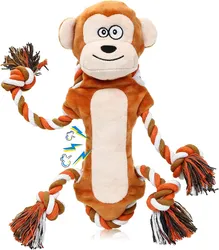Why Are Pet Toys Essential for Your Pet’s Health and Well-being?
2024-12-23
As a pet owner, ensuring your furry friend’s happiness and well-being is a top priority. One way to do that is through play, and pet toys play a crucial role in providing both entertainment and enrichment. But why exactly are pet toys so essential for your pet’s health and mental stimulation? In this blog, we will explore the importance of pet toys and how they contribute to your pet's overall happiness and health.
1. What Are the Benefits of Pet Toys for Physical Health?
Physical exercise is just as important for pets as it is for humans. Pet toys encourage active play and help prevent issues like obesity, muscle atrophy, and even behavioral problems caused by lack of exercise.
- Encouraging Movement: Toys that promote physical activity—like balls, fetch toys, and tug ropes—help your pet burn energy and stay active. Regular play can also help with weight management and muscle tone, reducing the risk of obesity-related diseases.
- Improved Coordination: Many pet toys, such as puzzle toys or agility training sets, can improve your pet’s coordination and reflexes, as they encourage movements like jumping, chasing, or retrieving.
- Promoting Healthy Teeth and Gums: Chew toys are not only satisfying for pets, but they also play a significant role in oral health. Chewing helps clean teeth, massage gums, and even reduce plaque buildup, leading to healthier teeth and fresher breath.
2. How Do Pet Toys Stimulate Mental Health?
Pets, especially dogs and cats, are intelligent creatures that need mental stimulation. Without enough mental engagement, pets can become bored, anxious, or even depressed. Pet toys help keep their minds sharp and engaged.
- Preventing Boredom: Pets that lack stimulation can develop destructive behaviors, such as chewing on furniture, digging, or even excessive barking. Toys like puzzle feeders, treat-dispensing balls, and interactive toys keep your pet’s brain active and prevent boredom-induced mischief.
- Building Problem-Solving Skills: Interactive toys that require pets to solve a puzzle or figure out how to release a treat help improve cognitive abilities. This type of mental stimulation is important for preventing cognitive decline, especially in older pets.
- Reducing Anxiety: Toys, especially chew toys, can help alleviate stress and anxiety in pets. For puppies, teething toys can soothe sore gums, while for adult dogs or cats, toys can offer a comforting distraction during stressful situations like travel or separation anxiety.
3. Can Pet Toys Strengthen the Bond Between You and Your Pet?
Play is an important way for you to bond with your pet. Engaging with your pet through toys fosters trust, affection, and companionship.
- Interactive Play: Engaging in games like fetch, tug-of-war, or hide-and-seek using toys is a great way to build a deeper bond with your pet. This type of play offers mental and physical stimulation while strengthening the relationship between you and your pet.
- Building Positive Associations: Toys can be used as a reward during training sessions, helping to reinforce positive behavior. This not only makes training more effective but also enhances the connection between you and your pet.
- Creating Fun Memories: Playtime with your pet can create joyful and lasting memories. Whether it’s a walk with a tug toy or a fun game of fetch, these moments of play contribute to a strong, positive relationship.
4. How Can Pet Toys Contribute to Socialization?
Socialization is an important part of your pet’s development, and toys can be helpful in encouraging positive interactions with other animals and people.
- Improving Interaction with Other Pets: Toys like balls, ropes, or frisbees are perfect for playing with other pets. Shared play encourages cooperation and helps your pet learn how to engage with others.
- Boosting Confidence: For shy or anxious pets, toys can be used as a tool to build confidence. Engaging in play with other pets or people can help them feel more secure and comfortable in social situations.
- Positive Reinforcement: Play is often a part of training your pet to interact appropriately with other animals and people. Pet toys serve as both a motivator and reward for positive social behavior.
5. How Do You Choose the Right Pet Toys for Your Pet?
Choosing the right pet toys is essential to ensuring your pet’s health and safety. There are a few factors to consider when picking toys for your furry friend:
- Size: The size of the toy should match your pet's size. A toy that is too small for a large dog can pose a choking hazard, while a toy that’s too large for a small dog or cat may be difficult for them to play with.
- Material: Look for toys made of safe, non-toxic materials, especially if your pet is a heavy chewer. Rubber, natural fibers, and durable plastic are popular choices for safe, long-lasting toys.
- Activity Level: Choose toys that match your pet’s activity level. Active pets may enjoy fetch toys or agility sets, while older pets may prefer softer toys for comfort or puzzle toys for mental engagement.
Conclusion
Pet toys are more than just a fun distraction; they play a vital role in your pet’s physical and mental health. From promoting exercise and improving coordination to reducing anxiety and strengthening the bond between you and your pet, toys are an essential part of any pet's life. By choosing the right toys and making playtime a priority, you can ensure your pet leads a happier, healthier life.



